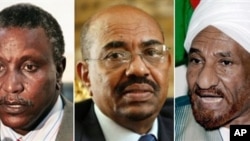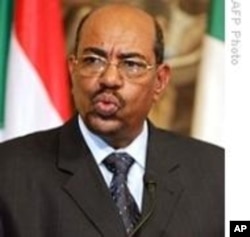Campaigning for Sudan’s first multi-party election in 24 years is underway after kicking off over the weekend.
Twelve candidates are running for president in the April 11 election, including longtime leader Omar al-Bashir, who is wanted by the International Criminal Court for war crimes in Darfur.
Fouad Hikmat, the International Crisis Group’s advisor on the African Union and Sudan, said while the April elections are important for Sudan’s democratic transformation, the outcome could be problematic for a number reasons.
“Very clearly Darfur is not being able to play a role in this election, and therefore I will see that the solution for Darfur after this election is going to be problematic,” he said.
Another problem, Hikmat said, is the fact that President Bashir’s National Congress (NCP) controls the national electoral commission.
“There is a lot of accusation that the environment is not free and fair given that the National Congress Party is controlling the National Electoral Commission and it will bring about a majority of a government that has been part of the conflict in Darfur. And therefore the election might not bring stability. On the contrary it might bring a sort of a continuation of violence and grievances after the election,” Hikmat said.
Hikmat said President Bashir would like to win the election to send a message to the International Criminal Court (ICC).
"Specifically Bashir, he’s being accused by the ICC, and that’s why it is extremely important for him to win the elections to give a message that if I was a person that committed crimes against humanity, my people wouldn’t have chosen me,” Hikmat said.
However, Hikmat said President Bashir would be making a false assumption about his legitimacy following the election.
“If he regains his legitimacy based on those grounds, then he would have got an argument to some an extent, although that argument whatever it is, it is not going to wave away a judicial process, and that is the process of the International Criminal Court,” he said.
Hikmat said Bashir could also use the results of the election to legitimize himself over his political opponents, including the Sudan People’s Liberation Movement (SPLM).
“For the SPLM, it is very concerned that the re-legitimization of the NCP which is not based on a fair and free election, might jeopardize the implementation of the remaining provisions of the Comprehensive Peace Agreement,” Hikmat said.
He also said a re-legitimized President Bashir could also have repercussion for Darfur rebel groups.
“As far as the Darfur rebel groups, they think that the re-legitimization of Bashir, given that he is going to argue that look I have been re-elected and therefore what happened in Darfur is not true and might give a sort of legitimate grounding for Bashir to continue not finding a settlement to the Darfur problem,” he said.
Hikmat said if this happens, it would mean that the violence in Darfur would continue because the grievances and root causes would not have been resolved,” he said.
He said if the April election happens in an atmosphere of illegitimacy, the new government and institutions which will be developed to continue the negotiations might not be acceptable by Darfurians, specifically the internally displaced.
At their last meeting in Ethiopia’s capital, Addis Ababa, African leaders reiterated their request for the United Nations to invoke Article 16 which allows the UN Security Council to suspend the ICC prosecutions for a period of 12 months so as to give peace a chance in Darfur.
Hikmat said the African Union’s Panel on Darfur led by former South African President Thabo Mbeki, recognizing the lack of an independent legal system in Sudan has recommended the establishment of a hybrid court system in Darfur.
“As far as the ICC (is concerned), that is up to the Sudanese to deal if they could reach a peaceful agreement somewhere in the future for a truce and reconciliation. But still that will not wave the request of the ICC which is to bring Bashir and other culprits into the process for international judicial accountability,” Hikmat said.








